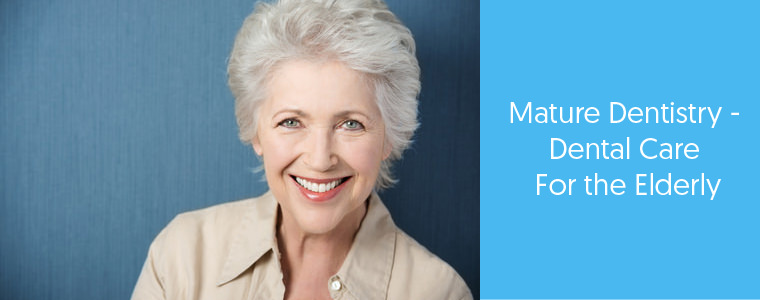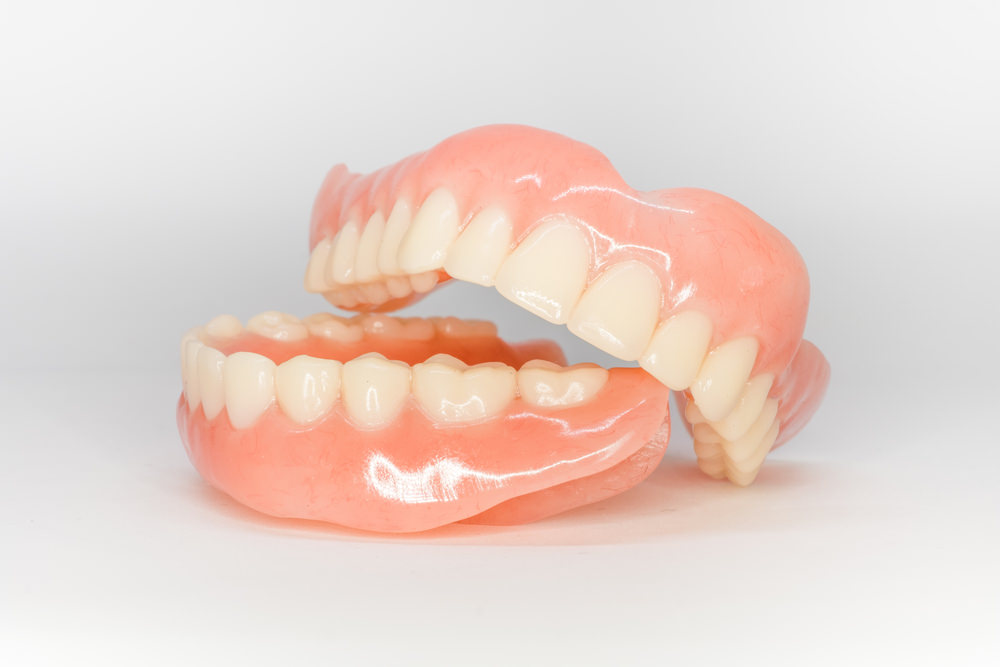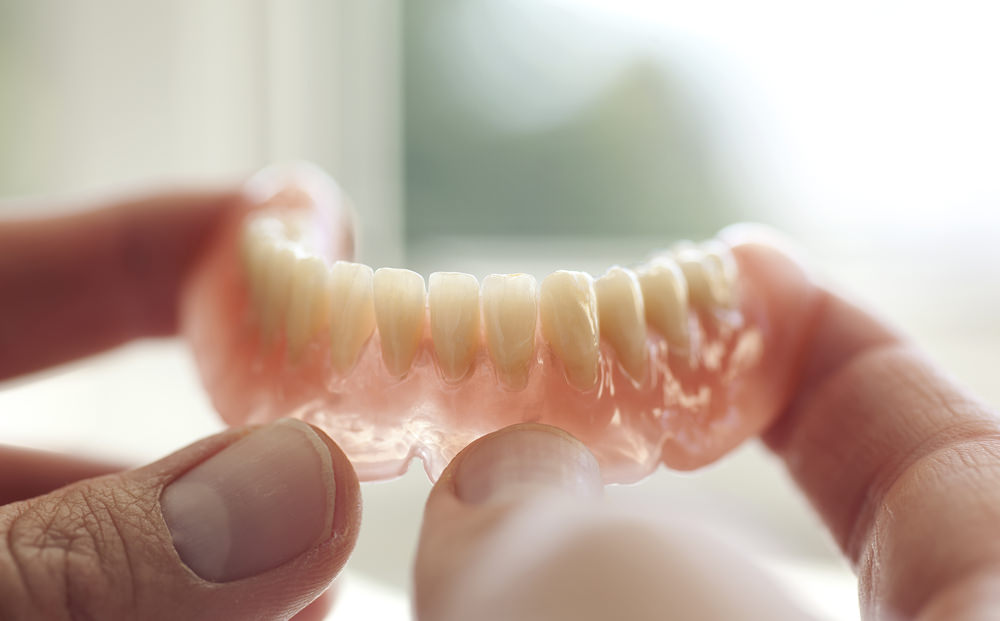Mature Dentistry – Dental Care For the Elderly
It’s unfortunate, but the condition of our teeth does decline the older we get.
It may be a case of lifestyle choices you made when you were younger catching up to you, or simply a factor of aging itself.
But it can lead to, among other things, a loss of teeth, gum disease, the reappearance of cavities, and even oral cancer.
Kinda scary when you think about it, I know.
The chance of having tooth damage severe enough to require a root canal or any invasive procedure triples once you are over the age of 65.
Most people have lost at least one tooth before they even turn 50.
So how do you recognise the symptoms and what do you do about it?
Today I will give you advice on exactly what is happening to your teeth as you age.
How your lifestyle and other factors may have a massive impact on the condition of your teeth, and how you can avoid yourself ending up in the dental chair.
After all, they say, “prevention is better than cure”!
If it’s too late and you’ve already recognised the symptoms of your teeth beginning to mature, I will also provide advice on how you can take care of your teeth.
So stress less, there’s no need to worry.
After reading this article you’ll have more knowledge on the health and safety of your smile!
What Happens to our Teeth as we Age?
When it comes to our teeth, we really can’t complain.
For such a strong body part, they’re fairly low-maintenance.
You can pretty easily keep them by following a good dental care regime and visiting your dentist for a check-up twice a year.
However, this routine gets a little bit harder to follow the older we get.
Many people find it harder to brush their teeth and even stop visiting their Dentist altogether.
The issue with that is, your mouth changes as you age, and cavities, gum disease, and oral cancer all become more common.
The nerves in your teeth can become smaller, and this makes your teeth less sensitive to cavities and such.
If you don’t continue to visit your dentist regularly for check-ups, these problems may not be diagnosed until it is too late.
What are the Common Causes of Dental Problems Later in Your Life?
Think for a moment about just what you’ve put your teeth through over the course of your life.
I mean, your teeth are incredibly strong, but they’re not indestructible.
All the chewing, gnawing, crunching and grinding you have done throughout your life will wear away the outer layer of enamel and flatten the edges of your teeth.
All the acidic foods and drinks such as oranges or strawberries, soft drinks or fruit juices, will dissolve the protective enamel.
Weakened enamel will lead the way for those serious dental problems later on in life such as tooth decay and cavities.
Have you been keeping a good dental care regime your entire life?
That includes brushing your teeth properly twice daily, flossing and rinsing, and visiting your dentist for twice-yearly check-ups?
If, for example, you have been missing brushing the back of your teeth, this is going to have a major impact on where you may get periodontal (gum) disease).
By the way, your dentist can tell just from the smell in your mouth if you smoke, there is no point trying to hide it from them with breath mints.
The risk of developing oral cavity cancer increases with age.
The odds of you developing oral cancer rises with each year you smoke or chew tobacco.
Most people who get mouth-related cancer are tobacco users.
Our advice?
Quit while you can.
What are the Most Common Dental Problems in Mature Teeth?
There are 3 main common dental problems that occur with mature teeth.
Periodontal (Gum) Disease
Many older adults have periodontal (gum) disease, which is caused by the bacteria in plaque.
Symptoms include noticing your gums receding, gums that bleed during and after brushing, red, swollen and tender gums, and a persistent bad breath or a bad taste in your mouth.
One reason gum disease is so common among adults is that it’s often not noticeable until it has advanced, and prior to that, it is painless.
If left untreated, your gums may pull away from your teeth, forming deepened spaces called pockets where food particles and more plaque will build up.
Then gum disease can become so advanced that it destroys your gums, bone and the ligaments that support your teeth.
As your teeth need strong support, gum disease is the main culprit behind tooth loss in adults. Especially when left undetected and untreated.
However, with regular dental visits, gum disease can be treated or prevented.
Treatments include scaling to remove the plaque and gum tissue, antibiotics, and in severe cases, surgery.
Oral Cancer
Your lip is the most commonplace for oral cavity cancer, with most tumours growing on the lower lip.
Then follows your tongue, mouth, and throat.
Men are much more inclined to be affected than women.
The initial symptoms of oral cancer are often missed, as they are quite subtle.
Signs that you should look out for are a white or red patch on your lip, tongue, or the bottom of your mouth that lasts longer than two weeks.
If you notice any of these, see an oral specialist.
Otherwise, continue to see your dentist for check-ups, as they will look for problems and treat them early.
As “prevention is better than cure” other recommendations are stopping smoking and drinking alcohol in moderation only.
Oh, and use lip balm with sunscreen in it – that’s not too much to ask!
Tooth Decay & Cavities
Are you wondering why you’re all of a sudden you’re getting a multitude of cavities again when you haven’t had them in years?
Well, as we get age, we enter round two of our “leave me alone, cavities!” years.
A common cause of cavities is dry mouth but this is not a normal part of aging.
The missing link?
Your medication.
Dry mouth is a side-effect in more than 500 medications.
Including those for anxiety, depression, asthma, allergies, high cholesterol, high blood pressure, pain, Parkinson’s or Alzheimer’s.
This is one of the reasons why you must tell your dentist what medications you are taking.
They can help assist in relieving the symptoms of dry mouth and prevent cavities.
What is the Average Age for People getting Major Dental Procedures?
The rates of oral cancer peak after age 60.
The average age of most people diagnosed with these cancers is 62.
In 2013, a survey conducted by the Australian Government Australian Institute of Health and Welfare showed that 1 in 5 (19%) people aged 65 and over had no natural teeth.
However, the rate of edentulism (tooth loss) has reduced over time.
For example, the number of people aged 75 and over who had lost all their teeth declined from 36% in 1987–88 to 28% in 2010.
The average age for people getting procedures performed for their missing teeth are;
- Veneers – 20 years old
- Crowns – Mid 30’s
- Root canals – 35 – 44 years old
- Bridges – 40 years old
- Dentures – 44 years old
- Dental Implants – 52 years old
As you can see, most people have had some form of major tooth work performed before they even turn 60, as they are likely to have already lost at least 1 tooth by then.
However, people are still getting even their Dental Implants well into their 80’s!
What Advice can you Give Me on Taking Care of My Mature Teeth?
Yes, we can give you a lot of advice on maintaining the health of your maturing teeth!
9 Tips to Take Care of Mature Teeth
Keep your mouth moist – Use over-the-counter oral moisturisers that can be purchased from your local chemist or supermarket, such as a spray or mouthwash.
Drink more water!
Carry a water bottle with you, and sip constantly (don’t wait until you’re thirsty to drink, your mouth needs to stay constantly lubricated!).
Chew gum – Sugar-free gum or even sugarless lollies will help stimulate saliva production and rid that nasty acid that eats at your enamel.
Get a humidifier – Anything that keeps moisture in the air will help.
Avoid foods and beverages that irritate dry mouths – This includes coffee, alcohol, soft drinks, and acidic fruit juices.
If you have to drink them, keep them minimal and eat some cheese and drink some milk afterwards.
Use an electric toothbrush – As you age, you may find that osteoporosis, arthritis, or other muscle or movement-related health issues can make brushing your teeth more challenging.
An electric toothbrush can be a huge help.
Invest in a flossing tool as well if you need to – anything for the health of your teeth!
Drink tap water – Most tap water contains fluoride, which will help prevent tooth decay.
Quit smoking – Not only does it put you at greater risk of oral cancer, but it increases issues with gum disease, tooth decay and tooth loss.
Basically, anything to do with the mouth!
Visit your dentist – I can’t stress this one enough – please see your dentist for your regular check-ups.
As you may not be able to feel the pain of any issues anymore, your dentist will notify you of any problems before you notice them.
Maintain a healthy diet – Ensure you get enough calcium and Vitamin D in your diet and watch your sugar intake.
Don’t chew ice or other hard foods.
Conclusion
You can’t erase a lifetime of damage, without assistance from your dentist, but you can keep it from getting worse.
Not keeping up a good oral health regime is going to cause problems at any age, but as you get older, it’s going to get worse.
Keeping your mouth looking and feeling young as you age requires hard work and self-care.
Brushing and flossing twice daily, regular dental check-ups, and a healthy diet are key.
But it’s all worth it for the sake of your smile and your self-esteem.
On a limited budget or just want to know how you can pay less for your dental work?
See our article Dental Work for Pensioners for advice on how you can get your procedures performed cheaper, or even free!
Are you over 50 and have a dental question? Leave a comment below!
By Anthony Cade
Created at August 09, 2019, Updated at January 25, 2025







